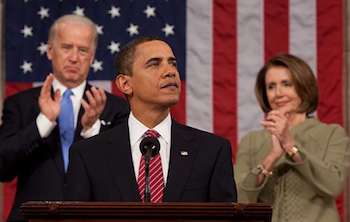- MENU
- HOME
- SEARCH
- WORLD
- MAIN
- AFRICA
- ASIA
- BALKANS
- EUROPE
- LATIN AMERICA
- MIDDLE EAST
- United Kingdom
- United States
- Argentina
- Australia
- Austria
- Benelux
- Brazil
- Canada
- China
- France
- Germany
- Greece
- Hungary
- India
- Indonesia
- Ireland
- Israel
- Italy
- Japan
- Korea
- Mexico
- New Zealand
- Pakistan
- Philippines
- Poland
- Russia
- South Africa
- Spain
- Taiwan
- Turkey
- USA
- BUSINESS
- WEALTH
- STOCKS
- TECH
- HEALTH
- LIFESTYLE
- ENTERTAINMENT
- SPORTS
- RSS
- iHaveNet.com: Politics
by Jules Witcover

President Obama
After a year of playing nice with the Republicans in
Returning to campaign mode by taking his argument out to the country in Ohio, New Hampshire and elsewhere, the president has climbed into the bully pulpit with a vengeance, pledging job creation while not abandoning last year's top priority issue.
He has intensified use of his most potent political weapon -- his
personal rhetorical and persuasive powers -- not only to assuage public
frustrations at Washington but also to challenge
the opposition in
His decision to speak to the House Republican caucus and entertain
questions was in an obvious sense an effort to advance his bid for
bipartisanship on
In so doing, Obama deftly employed the Q-and-A with a few
When a Republican from Texas posed a long question on the federal budget obviously crafted as a partisan argument, Obama interrupted him, charging that "the whole question was structured as a talking point for running a campaign." No progress was going to be made, he said, if the other party is characterized "as being irresponsible, the other party is trying to hurt our senior citizens, that the other party is doing X, Y, Z."
But in this nationally televised encounter and in his subsequent Q-and-A session the Senate Democrats, Obama himself reiterated that it was Republican fiscal irresponsibility in waging two unpaid-for wars and tax cuts to the wealthy that got the country into its deep hole in the first place.
Obama and his strategists have concluded that for all his travels and public engagements in his first year, he was under-utilized in terms of maximizing the new administration's best resource and must now re-engage.
In retrospect, the one arena in which Obama was most conspicuously
absent in the first year was in shaping and giving specific direction to
the health-care insurance reform that was his top priority. His decision
to have the Democratic leaders in the House and
Months and months were lost in futile efforts to coax a small handful of Republican senators to support one or another of the congressional Democratic proposals, and then in effect to bribe a recalcitrant Senate Democrat or two.
Those attempts were scuttled by the election in
Massachusetts of a 41st
He observed in his meetings with the House Republicans and with the Senate Democrats that he will be open in his second year to Republican ideas that could break the impasse on health care reform. At the same time, however, Obama's press spokesman Bill Burton seemed to signal continued presidential distance from specific negotiations. "He's not going to get into the nitty-gritty of what the best way forward is at this point," Burton said.
Many congressional Democrats disagree. They yearn for a president of their party who, like the late Lyndon B. Johnson, engaged up to his eyeballs in negotiating legislative details, in prodding and threatening lawmakers of both parties to do his bidding.
Johnson came to the presidency after a record as one of the
Available at Amazon.com:
The Political Fix: Changing the Game of American Democracy, from the Grassroots to the White House
AMERICAN POLITICS
WORLD | AFRICA | ASIA | EUROPE | LATIN AMERICA | MIDDLE EAST | UNITED STATES | ECONOMICS | EDUCATION | ENVIRONMENT | FOREIGN POLICY | POLITICS
Receive our political analysis by email by subscribing here
Obama's Re-engagement | Jules Witcover
© Tribune Media Services